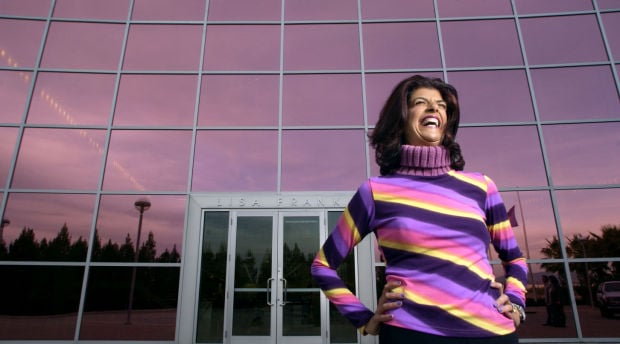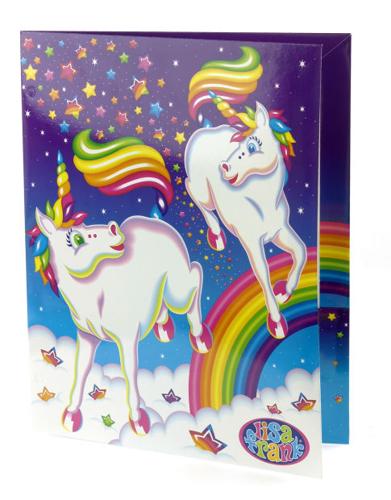Hers was a name most every little girl knew - Lisa Frank, creator of a line of vibrantly colored school supplies covered in hearts, stars and rainbows. In the '80s and '90s, she was an artist who reigned supreme as her folders populated school desks nationwide.
Hers was an empire known for its hot pinks and purples, lime greens and yellows. It was a world of illustrated unicorns, puppies and surfing penguins.
Now, Frank's namesake company is a fraction of what it was, and she has essentially disappeared. Her Tucson store is gone. Her spiral notebooks, stickers and pencils with butterfly erasers are a rarity on store shelves. Her factory, once bustling with hundreds of employees, has six staff members.
Frank's company, a victim of protracted legal battles over ownership and bad manufacturing deals, faded from popular culture - not an uncommon fate of the animal known as the retail fad.
Her factory stands, a colorful concrete oasis in the middle of the Arizona desert. Engraved in the building's light blue exterior are hearts and stars. Outside the door stands a silver unicorn missing its horn.
Ray Champaco, who has been the company's mailman since 1996, remembers seeing delivery trucks and working employees when he dropped off the mail. "But not anymore," he said recently. Today, silence, not people, greet him in the lobby.
There is no secretary at the front desk, only a telephone and instructions. Visitors are to call the appropriate extension, so a human being can come outside. Tour-seekers are politely, but firmly, informed that the factory stopped giving tours about a year and a half ago.
Frank founded the small company-turned-phenomenon in 1979, according to its website. During the next 10 years, she moved the company from a small guesthouse to its current 320,000-square-foot factory.
The company's accountant, Lee Gambrell, said employee numbers went from 350 to six over the course of a year.
Lisa Frank Inc. no longer manufactures products, contracting those jobs out now, Gambrell said.
Frank still runs the company but would not comment on its business.
Jackie Gambrell, a company official, said, "Lisa does not grant interviews."
Urban Outfitters appears to be the exception; she granted the American clothing company an interview in September 2012. But even there, she asked that her face not be shown for privacy reasons. Viewers hear from a silhouetted profile of Frank.
Urban Outfitters has a line of Lisa Frank T-shirts. There's the one with unicorns and one with the tiny rainbow-colored cactuses. According to the clothing store's website, it sells "rare vintage" Lisa Frank notepads, stickers and other items.
That's what she is now. Vintage.
Several former employees did not return phone calls or emails. But court documents tell a tale of a bitter divorce turned professional crisis. A series of lawsuits began in 2005 when Frank sued her ex-husband, James A. Green, co-founder of Lisa Frank Inc., and the company itself.
Several years later, Frank entrusted her company to a Delaware corporation, but according to a lawsuit field in Pima County Superior Court, the company reneged on promises to restore Lisa Frank Inc. to stores nationwide. So, she sued them in 2012.
The manufacturing and distribution company, CSS Industries Inc., told Frank that it could "put Lisa Frank back into most retailers in the US and Canada," court documents said.
The company also promised to sell more than $15 million in Frank's products within the first year of the agreement, resulting in $2.8 million for Frank. That didn't happen, according to the suit, which is still pending.
Lisa Frank Inc.'s situation is nothing out of the ordinary, said Chris Christopher, director of consumer economics and demography at IHS Global Insight, a Colorado-based research firm.
"Most companies are not comeback companies," he said. "If it's fashionable, the way up and the way down can be quite dramatic."
He added that some companies "survive in sort of niche places and they may reappear. Most don't."
Unlike the sales of consumer staples, such as toothpaste and toilet paper, Christopher said, a fad just dies down. "What's happening more recently in the digital age or on the Internet, is things don't have the longest shelf lives," he said. "It's part of the landscape."
Although Frank's products have not changed much, the company's marketing strategies have. The company now breathes through its Facebook and Twitter pages, which are updated regularly.
"Congratulations Class of 2013! #LisaFrank is your grad gift headquarters!" the company tweeted on May 29.
Many don't know her, but they do know the colors and images she created.
Brianna Herring knows her as "the one that does all the unicorns."
Herring, 20, a student of Pima Community College, did not own a Lisa Frank trapper keeper in elementary school but remembers her friends' Lisa Frank school supplies.
"I think we kind of grow out of the little girl unicorn and all the bright colors kind of thing," she said. "If she is still around, it's for little girls now."
Reporter Arielle Dollinger is a Stony Brook University student who took part in the New York Times Student Journalism Institute at the University of Arizona from May 19 to June 1. This article was originally published June 1 in the New York Times Student Journalism Institute newspaper.





